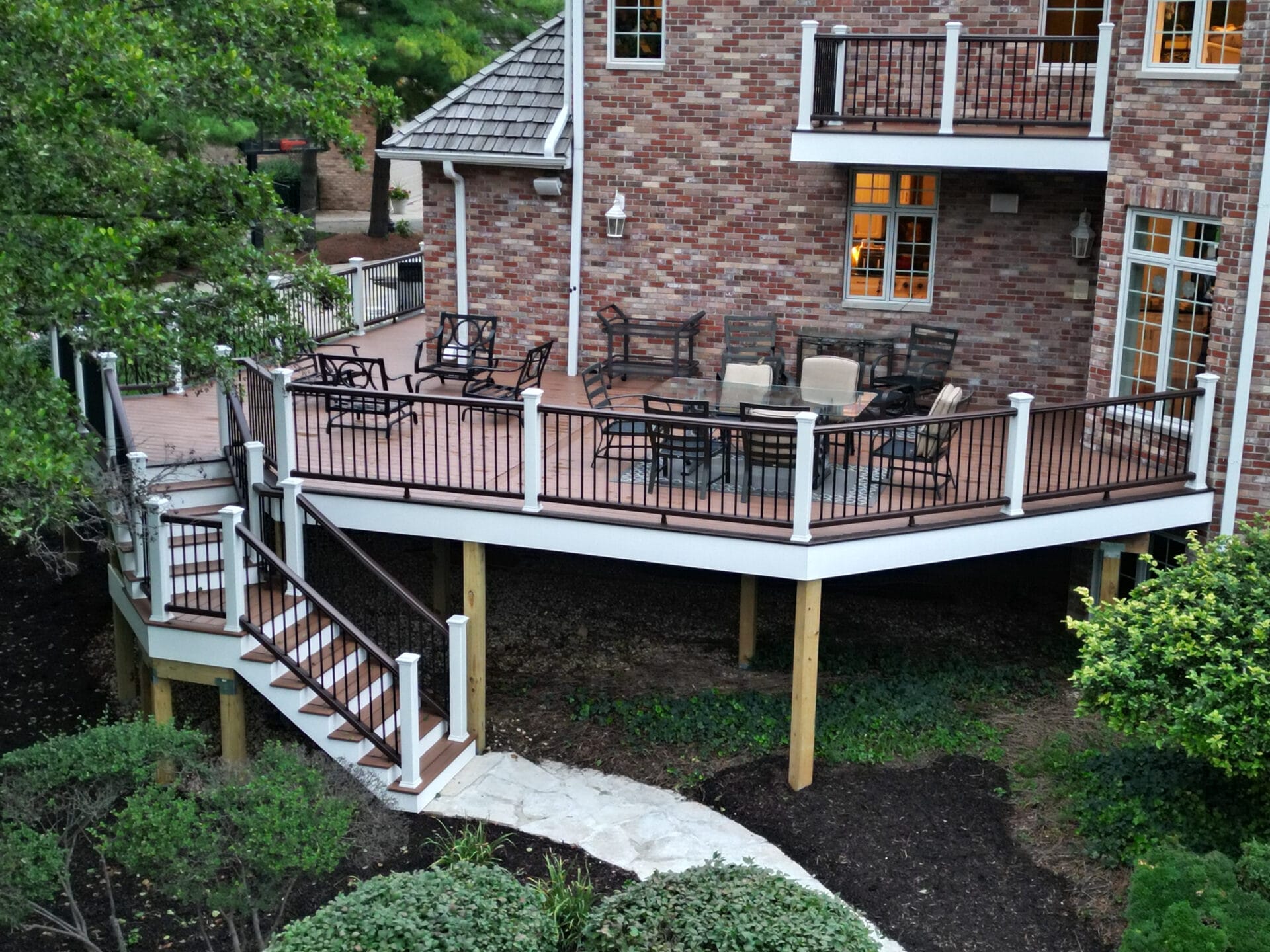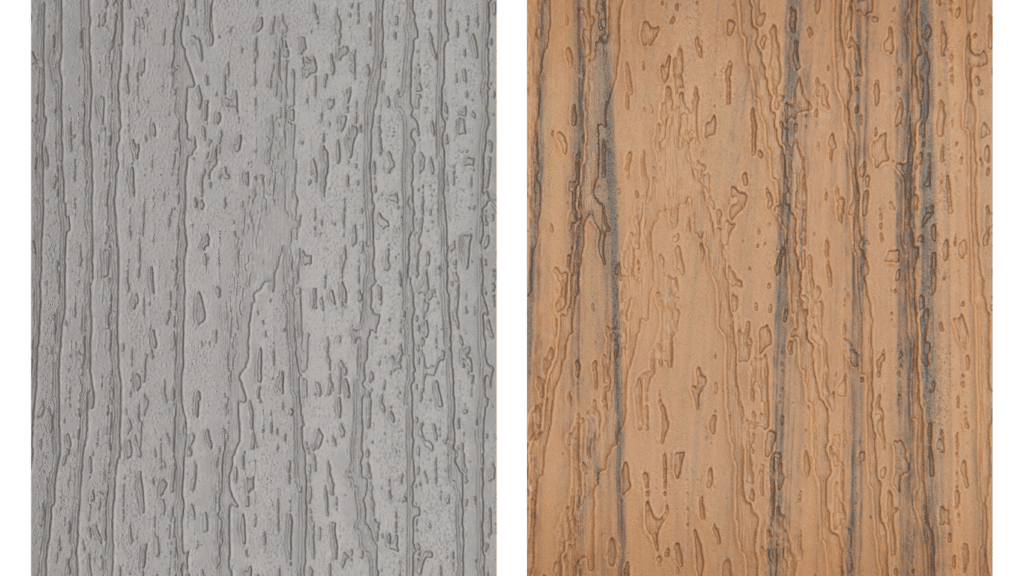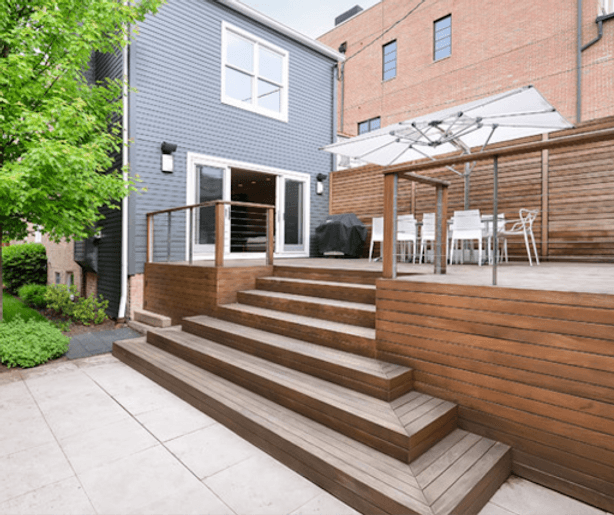
When it comes to outdoor living in Chicagoland, deciding between a deck and a patio isn’t just about preference; it’s about what works best for your yard, your home, and your climate.
Between harsh winters, humid summers, and shifting soil, not every surface holds up the same way.
This guide breaks down the key factors that should influence your choice. From construction differences to long-term maintenance, we’ll walk you through what to consider before committing to a backyard upgrade.
Should You Choose a Deck or Patio in Chicagoland?
The Most Important Thing to Know Up Front
If you live in the Chicagoland area and you’re deciding between a deck or a patio, we’ll make an excerpt of what matters most.
Decks, generally, perform better on sloped lots and wetter soil, while patios work best on flat, well-drained yards. And if you’re looking for a structure that handles freeze-thaw cycles and fluctuating weather with less risk of cracking or shifting, a composite deck is often the safer long-term choice.
Chicagoland (in general, Illinois) is a city of year-round temperature extremes. From snowy winters and wet springs to hot, humid summers, your outdoor space has to be built to survive all four seasons while looking its best.
In addition, the U.S. Climate Resilience Toolkit notes that the Midwest sees increased rainfall, stronger storms, and more frequent freeze-thaw cycles. Consequently, this consistent volatility puts pressure on materials that sit directly on the ground or are exposed to the elements.
All these (yard condition, climate, and long-term maintenance) realities should factor into your thought process before choosing a paver or deck size.
Looking for a deck expert to weigh your decision professionally for free? Call Naperville’s finest Trex deck contractors.
The Key Differences Between The Two Outdoor Structures

Learning the key differences between decks and patios, before worrying about picking design ideas and material samples. It’s as important as an athlete learning fundamentals or a chef cooking basic food before moving to advanced culinary skills.
The factors below will help you avoid costly and regrettable mistakes and choose the right fit for your yard.
Materials and Elevation
Decks are typically built from wood or composite materials and are raised above ground level. This elevation makes them well-suited for yards that slope or have uneven terrain. Patios, on the other hand, are ground-level structures built from concrete, pavers, or stone. They require a flat, stable base and are better for level yards with good drainage.
Foundation Requirements
A deck rests on posts anchored below the frost line, which protects it from heaving during freeze-thaw cycles. Patios rely on a properly compacted sub-base. In Chicagoland, where soil shifts with the seasons, patios may crack or become uneven if drainage isn’t professionally addressed during installation. That makes foundation quality a bigger variable with patios than with properly footed decks.
General Maintenance and Lifespan Differences
Wood decks require regular staining and sealing. Composite decks like those made from Trex last longer and require little upkeep, usually just cleaning. Patios may crack and need resealing. Paver patios can also shift or grow weeds between joints. On average, composite decks offer 25+ years of use, but maintenance demands vary greatly depending on material choice and installation quality.
Quick Look At Chicagoland Climate and What It Means for Outdoor Surfaces

Chicagoland’s climate isn’t easy on outdoor structures due to its four-season weather, which subjects structures to all extremes.
Freeze-Thaw Cycles and Frost Line Considerations
Illinois winters bring a slow but regular freeze-thaw damage to outdoor surfaces. Concrete pavers are susceptible to damage when moisture enters small cracks or gaps that expand as they freeze, causing shifts, cracks, or surface heaving. Patios built without proper sub-base preparation or drainage often suffer the most.
Ground movements hardly affect decks, especially those built on footings below the frost line in Chicagoland. Due to elevation, they avoid much of the moisture and soil pressure that compromises patios in the long term.
Snow Removal and Drainage Concerns
If you’re leaning toward a patio, monitor how your yard handles water in the winter before committing. Without the right slope, snowmelt can pool and freeze, which leads to slippery spots and surface damage over time. It’s fixable, but it needs careful grading and drainage during installation.
Decks are more forgiving in this department. Because they’re elevated and built with gaps between boards, snow and rain naturally drain away. If you go with composite decking, even better — it won’t soak up moisture like wood or concrete, so you’ll avoid the cracking and warping that often show up after a few Chicagoland winters.
Seasonal Comfort and Usability
Concrete and stone patios can retain heat in the summer and stay icy cold in the early spring and late fall, limiting their comfort range. Composite decking, especially newer boards with heat-reflective technology, stays cooler underfoot and is often usable earlier in the spring and later into fall.
If you’re looking to get more use out of your outdoor space across all seasons in Chicagoland, a composite deck may offer better comfort with less hassle.
Yard Conditions That May Favor One Over the Other
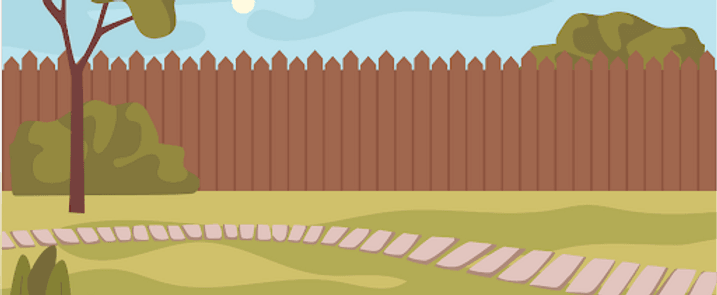
Not every yard is patio-ready, and not every deck is the easiest fit. Your property’s slope, soil, and drainage conditions can steer the decision before style or cost come into play.
Sloped Yards Work Better with Decks
Most of Chicagoland is flat, but not every backyard is perfectly level. Maybe you’ve got a slight slope near the back fence, a hill that drops toward a drainage area, or just uneven grading from older construction. If that’s the case, a deck can save you a lot of headaches.
Because decks are built on posts, they don’t need the ground to be perfectly flat. Instead of reshaping your yard or pouring extra concrete, the structure rises above the slope, creating a level, stable surface without major excavation. That flexibility makes decks a smart choice when your yard doesn’t cooperate with a patio design.
Flat Terrain Is Ideal for Patios
On a flat, well-drained yard, a patio can be a great solution. It feels grounded and can create a smooth transition between indoor and outdoor living spaces. In newer subdivisions around Naperville or other parts of Chicagoland where yards are often graded for drainage, patios can work well, as long as the soil stays stable and the base is compacted properly.
But if you notice pooling water or mushy areas in the yard after heavy rain, extra drainage work may be required to prevent future issues like cracks or frost heave.
Soil Type and Drainage Make a Big Difference
Some soils in the Midwest—especially clay-heavy ones—expand and contract more dramatically with moisture. This can put patios at risk of shifting unless a well-engineered sub-base is installed. Decks are less affected by ground movement since they’re anchored into deep footings and built above grade.
If you’re unsure about your soil’s stability or drainage, a professional assessment can help determine which structure will hold up better over time.
Cost Considerations and Long-Term Value

When comparing decks and patios, upfront cost is only part of the equation. The long-term value depends on how well the surface holds up in Chicagoland’s climate, how much maintenance it needs, and what it contributes to your home’s overall appeal.
Upfront Cost Comparison in Illinois
Concrete patios are generally more affordable at the start. In most areas around Chicagoland, a standard poured concrete patio might cost between $10 and $20 per square foot. However, prices rise quickly for stamped concrete, decorative borders, or premium paver finishes, often reaching $25 to $45 per square foot once materials and professional labor are included.
Decks typically have a higher upfront investment. A pressure-treated wood deck may start around $25 to $35 per square foot. Composite decks, which are popular in Naperville and other suburbs for their longevity and minimal upkeep, can range from $40 to $70 per square foot, depending on board quality, layout, and features like railings or lighting.
Maintenance Over 10–20 Years
Maintenance is where the long-term difference becomes clear. Patios may require resealing, crack repairs, and joint maintenance, especially in areas with regular freeze-thaw cycles. Water pooling or shifting soil can also shorten a patio’s lifespan without proper drainage and grading.
Wood decks need consistent care, including sealing, staining, and periodic board replacements. Composite decks, by contrast, require very little upkeep. They don’t splinter, rot, or absorb water, which makes them a reliable choice for homes that see all four seasons.
Resale and Curb Appeal in Suburban Neighborhoods
A well-designed outdoor space can significantly improve resale appeal, particularly in family-friendly suburbs where outdoor entertaining is part of everyday life. While both decks and patios can add value, composite decks tend to offer stronger buyer appeal thanks to their clean look and low maintenance. In competitive markets like Aurora, Naperville, and Bolingbrook, these features can make a noticeable difference from other homeowners.
Need Expert Advice on Aesthetic Opportunities With Deck & Patio?
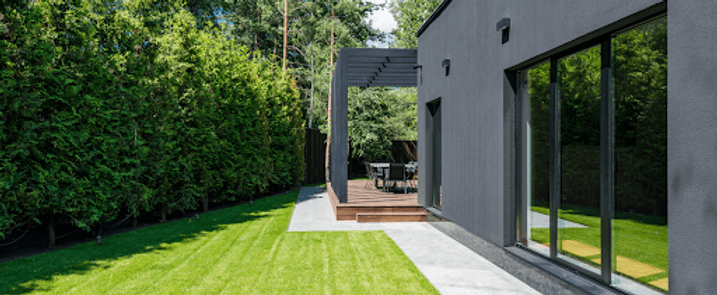
The right outdoor surface should feel like a natural extension of your home, both in function and appearance.
Architectural Harmony
Decks make a better choice for homes with multiple stories or walk-out basements. Elevated construction allows a seamless transition from the interior to an outdoor space without needing to alter the landscape. If your back door sits a few feet above ground level, a deck creates an easy flow from indoor to outdoor living.
Patios work well with homes that are built close to ground level. They offer a smooth extension of the first floor and lend themselves well to modern ranch-style homes or contemporary builds with wide, open yard space.
Material Finishes That Set the Tone
Decks offer a range of material choices. Composite boards are especially popular due to their consistent finish, fade resistance, and low maintenance. Available in wood tones, modern grays, and textured finishes, composite decks can be tailored to match trim, siding, or house color.
Patios can be finished in plain concrete, pavers, brick, or natural stone, depending on your design goals. While concrete offers clean lines and affordability, pavers and stone bring a classic, upscale aesthetic. Keep in mind that decorative finishes often require more labor and may need periodic resealing to maintain appearance.
Built-In Features and Functional Add-Ons
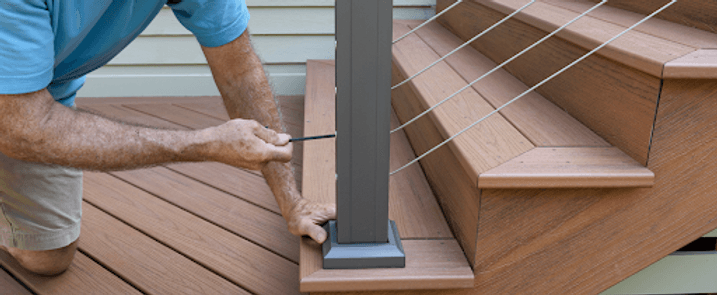
Decks are well-suited for built-in features like railings, privacy screens, under-deck storage, and integrated lighting. Elevated platforms also allow for covered areas beneath, which can double as storage or shaded entertaining space.
Patios are ideal for outdoor kitchens, fire pits, seating walls, and open dining areas. They can be designed with curved edges, border inlays, or integrated planters to give the space more character and functionality.
Ultimately, the right choice depends on how you plan to use the space and what fits best with the layout and elevation of your home.
Conclusion: Which Option Makes Sense for Your Home?
Choosing between a deck or a patio isn’t about looks (unless you have a strong preference), but about what fits your yard, lifestyle, and Chicagoland’s unpredictable weather.
At Warner’s Decking, we help homeowners choose outdoor spaces that match their goals and stand the test of time through free design consultations. We specialize in building durable, low-maintenance Trex decks, serving homeowners in the Naperville and Chicagoland area for decades.
Contact us today for expert consultation.
Frequently Asked Questions
What lasts longer in Chicagoland weather: a deck or a patio?
In Chicagoland’s climate, both decks and patios have their advantages. Decks, especially those made from composite materials, are designed to resist moisture and temperature fluctuations, making them durable against the region’s freeze-thaw cycles. Patios, constructed from concrete or pavers, can also be long-lasting but may be more susceptible to cracking due to ground movement and moisture infiltration. Proper installation and maintenance are key to the longevity of both options.
Which is easier to maintain?
Composite decks require minimal maintenance, typically just periodic cleaning with soap and water. Traditional wood decks need regular staining or sealing to protect against moisture and UV damage. Patios may require occasional resealing and weed control between pavers. Overall, composite decks tend to offer the easiest upkeep.
Can I install a patio if my yard slopes?
Installing a patio on a sloped yard can be challenging and may require significant excavation and retaining walls to create a level surface. Decks are often more suitable for sloped terrains, as they can be built above ground level, accommodating the natural grade without extensive ground alteration. Warner’s Decking offers traditional and curved Trex decks to satisfy any custom design preference.
What adds more home value in the Midwest?
Both decks and patios can enhance home value, but the return on investment varies based on materials, design, and local market preferences. In the Midwest, a well-designed deck can offer a higher ROI due to its versatility and appeal for outdoor living, especially when constructed with low-maintenance materials like composite decking.
How does climate change affect my choice between a deck and a patio in Illinois?
Rising rainfall and more freeze-thaw cycles in Illinois can cause patios to crack or shift if drainage isn’t well managed. Decks can handle moisture better and stay elevated above soggy ground. For long-term durability in unpredictable Midwest weather, composite decking often holds up better with less maintenance.
